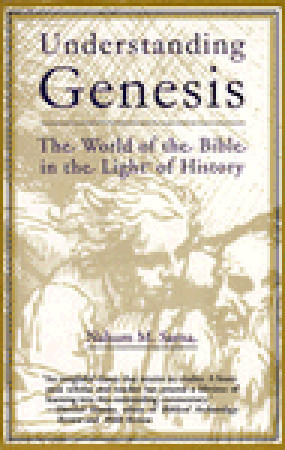- Mesopotamia viewed the 7 and any multiple of 7 as a bad omen when it came to a lunar calender, yet Israel viewed it with positive connotation instead. Shabbat and shappatu share a similar wording, but shabbat means "cease from work" which has a diff meaning than shappatu
- Even though God creates sea monsters, like leviathans, theres no cosmic combat myth within the structure of Genesis. Leviathans are creations of God and do not seem to try to oppose him much as opposition to Babylonian myths.
- Cain kills Abel, but his premeditated murder could not be premeditated as of which there was no innate concept of death and murder. Yet his anguish was still condemned, he committed fratricide since everybody was considered a child of God. He became a social pariah because he committed a crime against man and society, and through that he sinned against God.
- The Flood story is similar to mesopotamian stories like the Epic of Atrahasis. with the whole word flooding, Gilgamesh also visits Utnapishtim, who gains his immortality through surviving a flood ridded with godly civil chaos.
- God is transcendent and has full dominion, leaving the flood as not a freak of nature like in the Mesopotamian myths, but as a divine decision. Whilst the mesopotamian gods quarreled and were limited.
-Babel derives from akkadian, babil-im, "Gate of god", Biblical author satirizes this name into a meaning of incompatible speech. Mocking pagan beliefs. The tower or ziqqurat served as a source of pride for the citizens, a social and religious sin against God. the ziqqurat symbolized a mountain, something in ancient near eastern religion was a sort of abode of the gods, where they descent and meet human beings; revelation. it was the mediator, the navel of the earth, axis mundi.
-patriarchs ages are symbolic in ancient near eastern context, The 480 product of years serving is the multiple of 12 x 40 (abraham to joseph), 40 as a number has a particularly large significance in israel. patriarchal period is meant to be schematical and rhetorical. significant events expressed as multiples of 5 and 7 (abrahams death, isaacs death, jacobs death)
-the patriarchs premosaic covenant engaged in more later diabolical acts, like jacob who married two of his sisters. the archaic nature of the patriarchs is indisputably not of developed ideas, it is substantial in telling.
- the displacement of amorites was by the universal binding law, for they sinned against God, there was why, in the covenant, the ownership was transferred. To cut a covenant derives from cutting an animal to seal a treaty.
- Concubinage in Genesis 16, was normal premosaic covenant, Nuzi texts describe on how if a wife was barren, she must grab another in her place to bear.
-Circumcision was practiced by many lands, including Egypt. So God ordered this not as a new rite, but a transformation of a previous and already dwelling one.
- When God 'annihilated' Sodom and Gomorrah, it suggests a tone of earthquake, rather than a volcano, since scientists in that region have not suggested any eruption. It couldve been mixed with asphalt and bitumen, and ignited it. Which is why in Gen 19:28, it references that the smoke is similar to a smoke of a kiln. Sodom and Gomorrah couldve been an independent narrative from Abraham, since theres not really evidence to suggest the substantiality of the story.
- The literary device of "Go forth" is a parallel between Haran and the Akedah. Emmunah, a hebrew word that is defined as faithfulness, and stead fast loyalty appears quite often in the text. God's essential quality is emunnah.
-Thigh in ancient israelite context is reflective and derives from the sense of reproductive organs. It is the solemnty of oath placed, especially on parts that are integral to ones identity. He would be the father to many nations, "exceedingly fertile". The correlation of that of which can be paralleled.
-The struggle in Rebekahs womb of the "two nations" is the retrojection of further prophecy, of inheritance, and soon war. This is further dramatized in where Jacob is seen clenching on Esaus foot. Yet even though the Bible prophesizes, it does not condone Jacobs trickery. The firstborn right in israelite tradition recounts that it becomes an exclusive divine possession of God, the concomitant being that obligations are placed onto the firstborn.
-Bethel is seen as repugnant in later israelite traditions, like by amos and hosea, satirizing it to "House of delusion" despite this, the early tradition connecting Jacob to Bethel was never changed nor edited. Abraham is twice recording worshipping as Bethel, so it could be an anachronism.
-Jacob's family, or families in Genesis, were rather clans. Patriarchs were head of clans, the story of jacob leans more into an historical document bc of the fact it contained good genealogies.
-Ancient Near eastern context values dreams, predictably, and that could be the case for Joseph, which dreams were applied to ones personality
-Joseph sees himself as "Father of God" in reference to the fact Egyptians called themselve gods, meaning he was of good status in relation. He becomes secretary of agriculture in egypt, a strange job after being a nomadic semite shepherd boy for the years of early life. The hyksos invaders probably took Joseph in bc of his semitic background, as relation, hyksos also had a chariot and a horse to ride around, and Joseph being able to do just that, means it was under hyksos domination.

